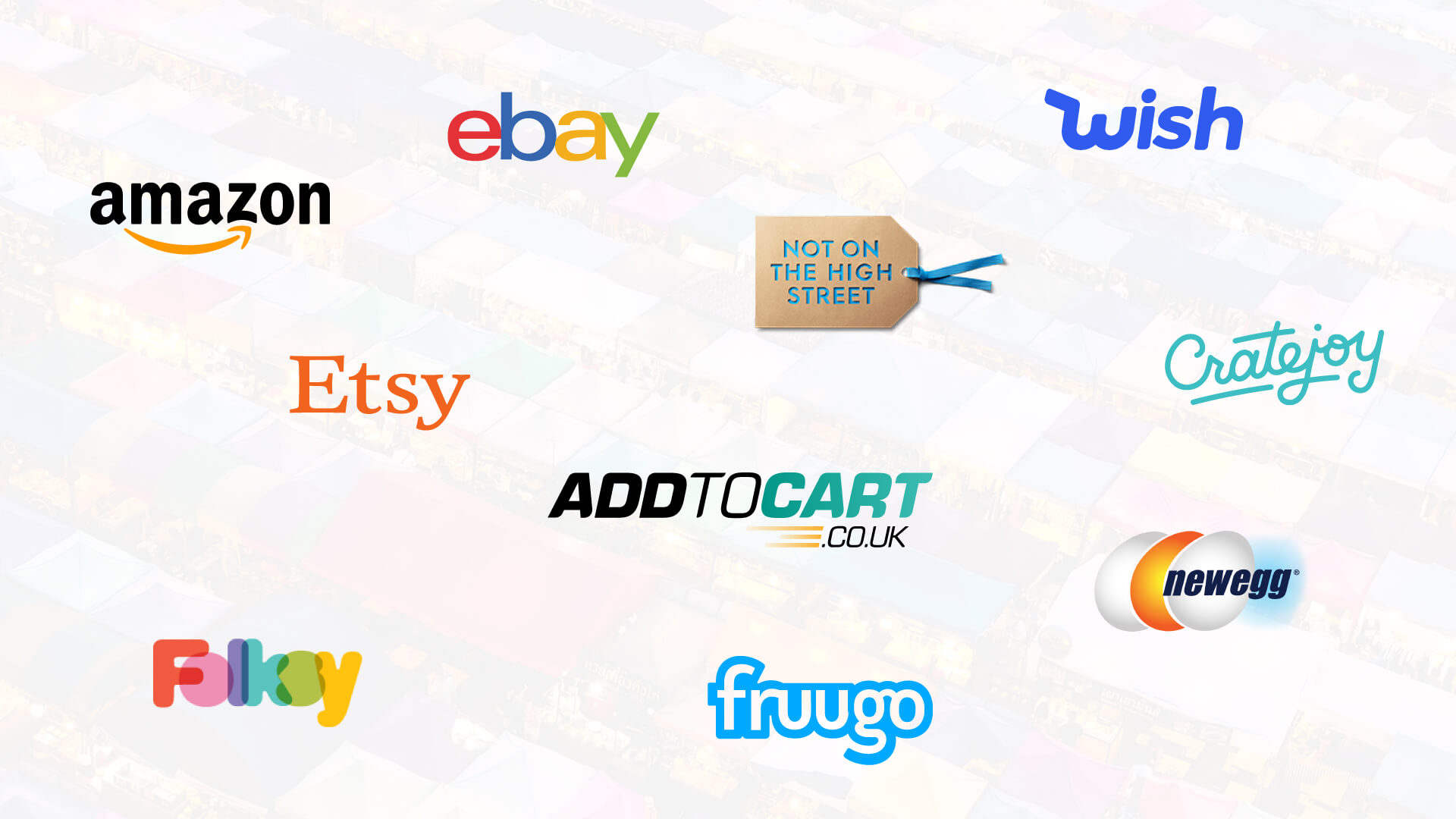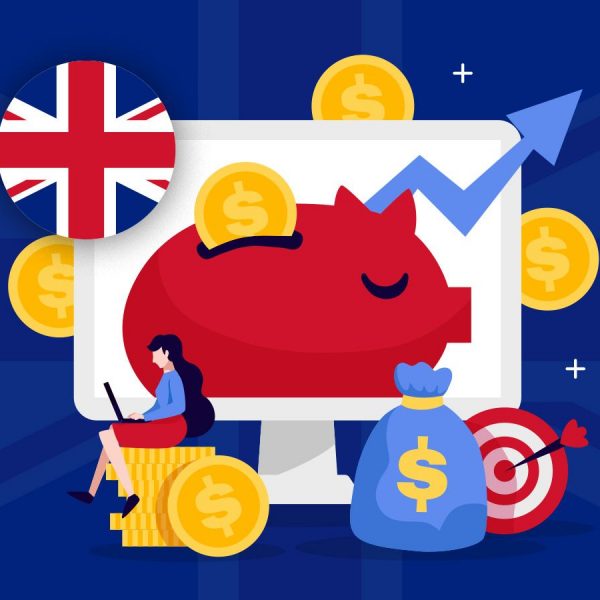If you’re just starting out on your independent business adventure – or you’re an established seller wanting to broaden your customer base – you’re probably looking at using an online marketplace to boost sales. But these days, there are so many to choose from. So how can you pick the right one to build your brand? Here, we take a look at the top 10 e-commerce marketplaces.
Amazon
Although it’s come in for a lot of criticism of late, Amazon is still top of the online marketplace game, with more than £17 billion of annual sales in the UK alone. Currently, experts estimate that this global brand is the first port of call for over 20% of customers when it comes to shopping online.
So should you sign up with Amazon? Well, there are certainly some positives to doing so. For one, you’ll get access to multiple markets across Europe with just one seller account, and it’s relatively easy to get set up and start selling. Plus, you’ll have a presence with the undisputed king of the online marketplace world.
But there are cons to selling with Amazon too. The high commission, for example, can often pose a challenge for many small businesses, while the marketplace’s ownership of the customer-seller relationship makes it difficult to develop brand loyalty. What’s more, there are a number of ethical issues surrounding the marketplace that might give some sellers pause for thought.
eBay
Another global giant, eBay also enjoys a large portion of the market share. Originally set up as an auction site, the popularity of the “Buy it now” feature has seen it transform into one of the world’s biggest online marketplaces. Good for sellers of niche products, such as antiques and collectibles, eBay is a good choice for businesses looking to build their own brand.
For sellers, eBay promises a huge community of active users and the chance to communicate directly with your customer base. But, of course, there are some downsides too. For example, there are a fairly extensive set of rules and regulations to abide by, and the cost of listing fees can be off-putting to some smaller ventures.
Etsy
A marketplace with a focus on handmade, bespoke items, Etsy has grown exponentially in recent years. Having won recognition for its simple interface, this is where many small-scale producers start out in their e-commerce adventure. And with its low listing fees, there isn’t a huge amount of risk associated with setting up an Etsy store.
What’s more, you’ll reach a huge audience of more than 80 million buyers, most of whom come to Etsy specifically to source handmade items – giving you one of the most active customer bases around. As an added bonus, the platform’s built-in analytical tools allow you to make informed decisions about your business.
Etsy, though, is only for bespoke items – meaning it is not suitable for many online stores. And although the listing cost is low, the site also charges a 5% transaction fee on all sales plus a credit card fee – amounts that will certainly add up over time.
OnBuy
On a smaller scale, one marketplace that has been steadily growing in popularity is OnBuy – a UK-focused platform working with small-to-medium businesses to provide a secure online shopping experience. Since their launch in 2016 they have grown to offer more than 35 million products, proving that there is definitely a market for viable alternatives to the big names.
For sellers, OnBuy offers access to some seven million shoppers along with a competitive pricing structure, making them an attractive option for anyone looking to explore new outlets for their sales.
Add to Cart
Positioning itself as an alternative to the major marketplaces, Add to Cart is all about supporting independent businesses, recreating the experience of shopping small and local online. The key factor here is SEO – something that many small start-ups struggle to master. With Add to Cart, their resident experts get to work behind the scenes, boosting visibility and driving sales for your business.
With no listing or joining fees, Add to Cart is a great option for small businesses, as you only pay once you make a sale. And with a 10% commission fee, it’s more economical than many of its more long-established competitors. Unlike larger marketplaces such as Amazon, they also share buyer data with sellers, allowing you to build personal relationships with your customers.
Not on the High Street
Like Etsy and Folksy, Not On The High Street positions itself as the go-to store for unique and quirky products – although items on this platform tend to be more slick and polished and less handmade. But while this marketplace has cornered the market in quality gifts, it’s not right for every seller.
To benefit from selling on Not On The High Street, you’ll need to have a product that meets their specific aesthetic – and doesn’t compete with any existing offerings. On the flip side, that means that if your product is accepted, it will appear on the marketplace without direct competition. Expect to pay a hefty price, though – Not On The High Street takes a whopping 25% commission on sales.
Folksy
Like Etsy, Folksy is a marketplace that focuses on handmade goods. But while Etsy users need to compete against more than four million active sellers, Folksy offers a far more intimate experience, with less than 10,000 stores currently active on the site.
Another advantage of Folksy is that the platform offers a choice of pricing options, from pay-as-you-go accounts suited to small start-ups to the Plus option for businesses with a bigger turnover. But the smaller scope of the site has its disadvantages too, as Etsy remains the go-to marketplace within the handmade category.
Fruugo
If you’re looking to take your business international, Fruugo is a great place to start. Covering 23 different countries worldwide, this platform automatically translates your sales text into one of 11 languages – making your store accessible to a global network of customers with minimal effort on your behalf. Because of this innovative approach, Fruugo has been growing in popularity in recent years, and this trajectory looks set to continue.
It’s far from a market leader, though, and there are a number of marketplaces offering similar tools – making it hard to know which one to throw your lot in with. And Fruugo’s nifty features aren’t cheap: they take a 15% commission on sales, plus additional processing fees.
Newegg
Another speciality marketplace, Newegg is aimed at sellers dealing in electronics. For buyers, it’s a great place to get the best deals on a wide range of products such as computers, laptops and other household items. And for sellers, it offers its own fulfillment service – great if you don’t want to have to deal with things such as shipping and returns.
Not just anyone can sign up, though – prospective sellers must submit their products for approval, and they’ll need to meet certain standards to get through. If you make the cut, you can list your items for free up to a limit of 5,000 submissions.
Cratejoy
Subscription boxes are one of the hottest new e-commerce trends, offering customers curated products in return for a monthly subscription fee. If this is a business model that you’re considering, Cratejoy is definitely worth a look. With millions of customers worldwide, this platform offers access to an audience that is already interested in signing up to a subscription box – essential for building your customer base.
Cratejoy is also one of more feature-packed offerings too, with extras like analytics tools, payment management and integrated CRM. And at just 10% commission, it’s one of the more affordable options.






